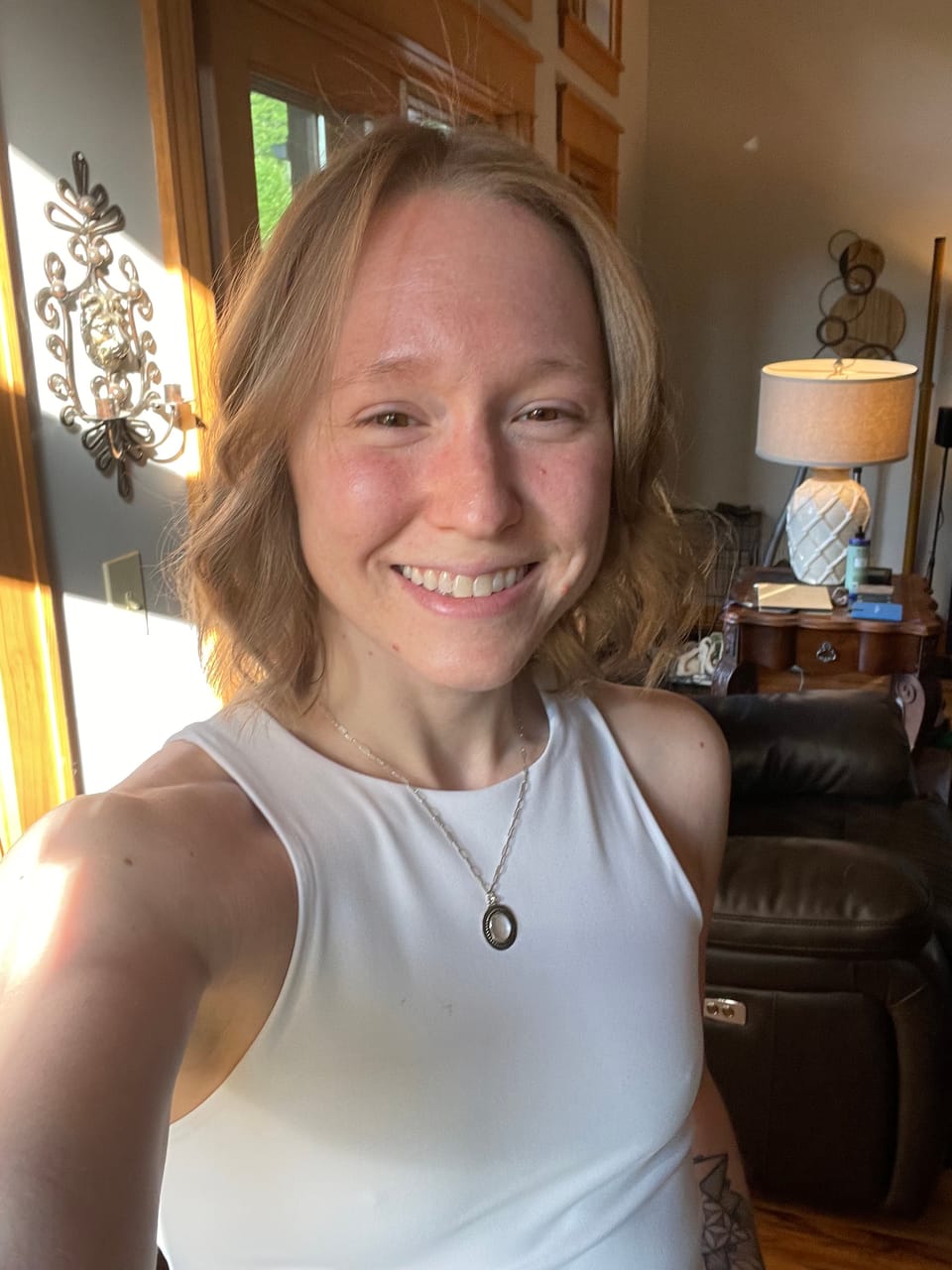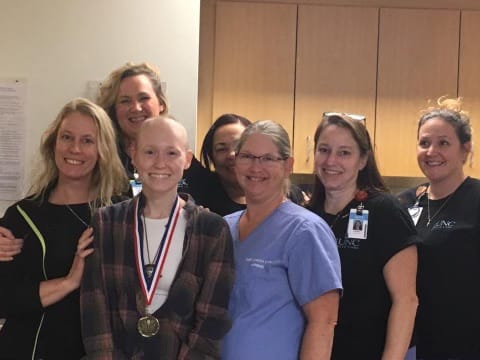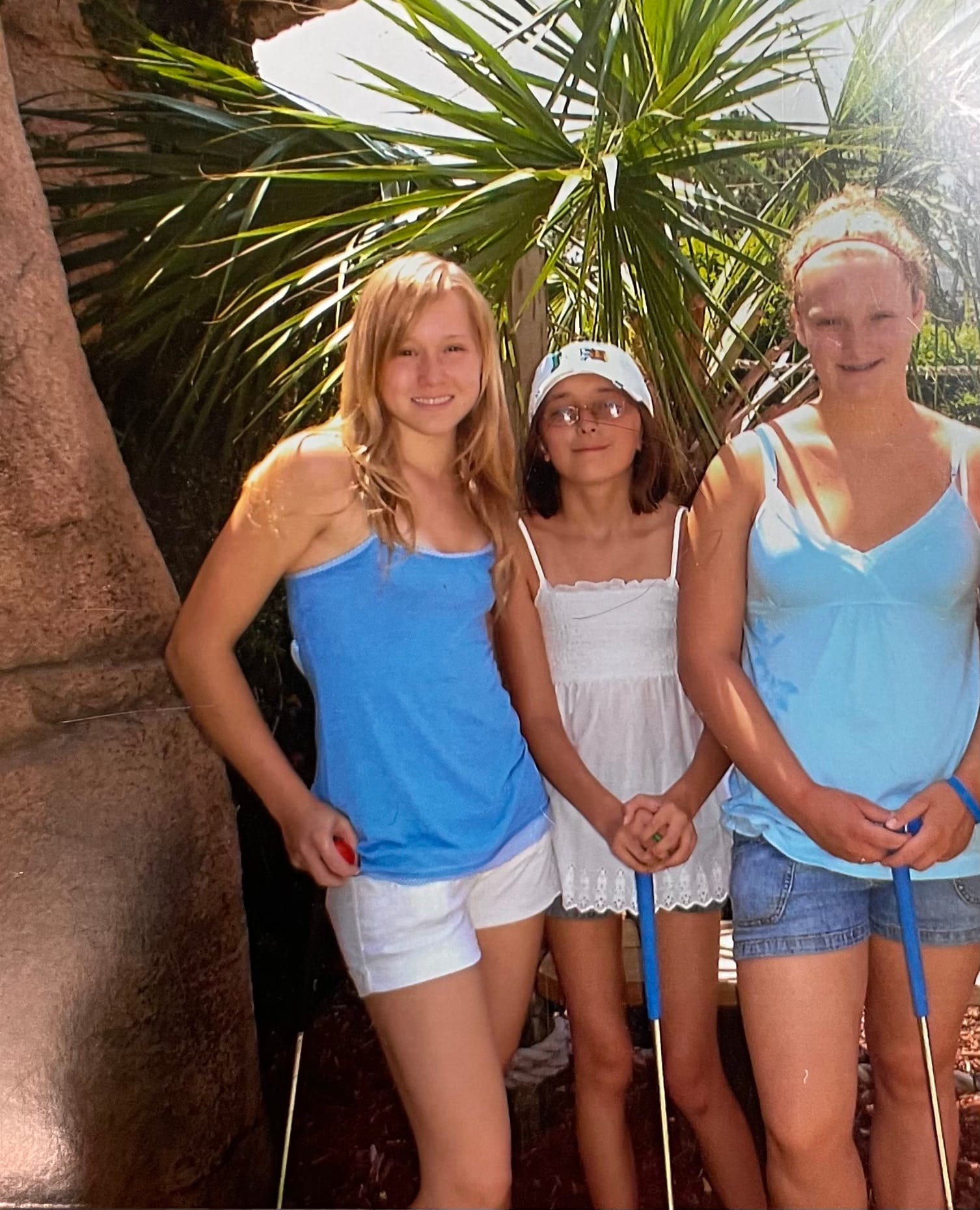Sydney: twice-healed - lymphoma

Sydney was initially diagnosed with lymphoma in eighth grade after she hugged a friend at the end of the school year and felt sharp pain in her neck that led to swelling. That swelling would be diagnosed after a beach vacation as Hodgkin lymphoma. The cancer would be cured, and then recur years later, and she healed again. In this interview, I share her unique story of healing twice - once as a child, and once as an adult - and how her perspective and understanding of whole-body wellness has shifted from her cancer and the passage of time.
Sydney presently lives in the High Country of North Carolina and is engaged in self-care through regular yoga practice, functional fitness in her (gorgeous) new basement gym, and self-reflection.
She is open to connecting with others, particularly if aspects of her story resonate: sydney@sydneylysinger.com.
diagnosis: then and now
I was diagnosed in the summer of 2008, and it was kind of a blur to me now because this was 16 years ago. But my mom delivered the news to me at a neighbor's house, I think because she didn't want me to associate the bad news with my mom's or my dad's houses. What was interesting was I had a full body rash a few years prior and a lot of symptoms that were concerning for cancer, including swollen lymph nodes, but it turned out to be cat scratch fever.
The second time I was diagnosed was very frustrating. I had the same symptom - swelling in my neck, in the same place - noticed by my aunt a week before a beach vacation (at the same place I went after I first had symptoms in 8th grade!). I scheduled a biopsy, and when the results were ready, the office (a new doctor to me) told me I needed to come in to get the results. I was very frustrated because this was not my first time getting cancer, and I just wanted to get my other appointments scheduled, especially since traveling to this office was a burden for me coming from the mountains. I explained this to them, but they said "That's not how we do things. You have to come in." My mom called and demanded they tell me the news officially over the phone. After I did finally receive the news over the phone, I was so unfazed when I returned to work after the call that my coworkers assumed it was good news. I had to clarify that to them.
I never felt like I was going to die either time I was told I had cancer. I think this was because they told me the prognosis was so good, and everyone around me was so positive and supportive - especially doctors and nurses. One nurse in particular, when I was young, connected with me because we were both reading Twilight. It was helpful to connect with them in different ways. In retrospect, I wonder if I was medicated more heavily and in different ways when I was younger because it feels a lot more blurry in my memory, and I wasn’t present for my treatments the way I was for my second diagnosis.
The second time I was diagnosed, my doctors weren’t worried; I was healthy, I ate well, I was a vegan at that time. They didn’t think I would succumb to the illness or the side effects of treatment.


Left: Sydney leaving the floor after autologous stem cell transplant at UNC, wearing the medal she earned for walking a full half marathon during her treatment; Right: Sydney in 8th grade, just prior to her first diagnosis
Where do you think your dis-ease came from? (spelling intentional; see Louise Hay)
I’m not sure where my disease came from. I blamed food when I was younger. But I’m not sure. I wondered “What could I have done to bring this on myself?” At that time I don’t think there was an emotional component to the original diagnosis. I’m not sure if the burying of other emotions affected my relapse, or if the treatment I got at first wasn’t as good as the treatments we have today. I don’t necessarily align with a particular religion, though I am spiritual. I'm torn between believing the world is chaos, sometimes bad things just happen sometimes, and believing that sometimes there is a greater purpose and meaning.
can you describe what it felt like at your sickest point?
After my second diagnosis, I was treated with an autologous stem cell transplant (my own stem cells), which was performed after about six days of intense chemotherapy. On day 10, I remember all the chemo hit me like a bus. I laid in bed and didn't even want to get up to go to the bathroom, because my body was just done. It hurt to move, and my will was totally depleted. The floor staff wanted me to be as active as I could. At UNC on our floor, which was in isolation (kind of like COVID times), they wanted me to walk every day. They gave out awards for patients who walked a half marathon by the end of their stay. I got that medal. But I didn’t get out of bed for that one day.
At my worst point, on that day I felt so exhausted, I didn’t have a lot of hope. I was in so much pain, and was so sad to be there. I couldn’t leave the floor of the building because my immune system was wiped clean, and it was too risky. I felt stuck.
healing: what was helpful? how did you heal?
I utilized Western medicine for my treatment; I was really opposed to seeking outside help [i.e. from other types of healers] when I was diagnosed, even as an adult after the recurrence. Once I finished cancer treatment, I rejected the idea that I needed any more help. Once I healed, I didn't even want to acknowledge that I had cancer. At first, I wanted to just ignore that it had happened. I didn't want to pick it up again. But it started to become evident to me that I had underlying issues that were causing strife and stress in my relationship with myself and others. About two years after I had finished my stem cell treatment, my long-term partner and I separated. I started moving through that pain in some really unhealthy ways. My mom reached out and encouraged me to get my yoga teaching certification where she had completed her own certification, and the timing worked out really well - it felt like exactly what I needed, even though I hadn't planned or budgeted for it. It gave me structure and joy, and helped me move through a lot of heaviness. It gave me a shift - I realized: "I don't have to keep living the way that I'm living." I was the youngest person in the training, and I had so many mentors. Through them I learned new ways of living and being. Therapy helped me learn how to talk freely; that was hard because people-pleasing has been a lifelong struggle for me. Three years later, I think therapy is the best thing that's ever happened for me. It helps me reframe how I see myself, my relationships, and my life.
Because of yoga and therapy, today, I trust my own intuition so much more. Last year [2023] I decided I didn’t want to drink alcohol anymore. It had been a crutch for me for the past 8 years, a habit of socialization, a way to permit me to feel safe and loose in my body and have fun. It didn’t impair my day to day functioning, but it affected how I socialized with others and I realized the beliefs I held, about how I thought I had to use it to be comfortable and social with others, to have that release.
what do you wish was different about medicine in America?
I wish physicians SPENT MORE TIME with patients. I’ve had wonderful caregivers, but they didn't always take the time to really care for me. I recently had a great appointment with my survivorship doctor - he spent a whole hour with me, which hasn’t happened in years. It’s important to me to have time not only to go through things with your doctor, but have that person really want to show up for you. This means taking the time to talk about symptoms and what could be causing them, and things I can do on my own to heal - not just handing me a prescription and sending me out the door. Sometimes it feels like the doctor is thinking: “You have 5-10 minutes, and then I want to get you out”. I want a doctor who wants to take care of me holistically.
I want a doctor who wants to take care of me holistically.
what do you want future healers to know?
My answer before, about spending time with patients, is really important. But also: come back to your reason, your why, and make that your focus. Working in healthcare can be such a heavy, challenging job. Show up for yourself. Make sure you’re doing the work to take care of yourself so you can care for patients.
Show up for yourself. Make sure you’re doing the work to take care of yourself so you can care for patients.
how has your healing journey changed you, how you see the world, how you interact with others?
It’s hard because I still have a lot of anger, having had cancer twice. But there’s also this gratitude, because I know it’s shaped who I am. I wouldn’t be who I am if I hadn’t had those illnesses. I know I’ve lived a pretty privileged life - I have both of my parents, I went to catholic school and college. These diagnoses have made me more grateful and less selfish, less expectant that things are just going to be handed to me. I have more gratitude for being here.
In terms of interacting with others, and how I see the world, I’m more empathetic and understanding of others. I try to approach people with what I hope to be approached with: non-judgment and a grain of salt! I enter with hopefulness that they will also have gratitude, joy. I remind people that there’s more than one way to see whatever is happening in their lives.